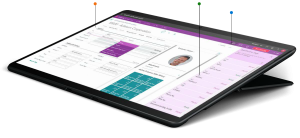Introduction
 CRM systems are software solutions that help organizations manage and analyze customer interactions, enhancing customer satisfaction, retention, and business performance.
CRM systems are software solutions that help organizations manage and analyze customer interactions, enhancing customer satisfaction, retention, and business performance.
They are essential for various industries, as they optimize sales and marketing, improve customer service, provide valuable customer insights, streamline collaboration and communication, and offer industry-specific customization.
CRM systems help businesses manage sales pipelines, track leads, automate sales processes, and improve customer service.
They also provide a comprehensive view of customer interactions, purchase history, and preferences, enabling personalized support and efficient issue resolution.
CRM systems also provide valuable customer insights, allowing businesses to refine their products and services, identify cross-selling opportunities, and anticipate customer needs.
They also facilitate real-time data updates, task management, and document sharing, promoting efficient teamwork and productivity.
Overall, CRM systems play a vital role in managing customer relationships, streamlining processes, and driving growth, providing organizations with a competitive edge in today’s dynamic business landscape.
Importance of CRM in leading to loyal customer
It is impossible to overstate the significance of CRM in the journey from lead to loyal customer.
CRM systems play a crucial role in cultivating and sustaining customer relationships throughout the entirety of the customer lifecycle.
Here are a few essential points emphasizing the importance of CRM on this journey:
Effective Lead Management: CRM systems allow businesses to effectively capture, monitor, and manage leads.
CRM systems ensure that no potential opportunity is neglected by centralizing lead data and automating lead management processes.
This enables businesses to efficiently respond to inquiries, qualify leads, and allocate resources, increasing the likelihood of converting leads into customers.
By providing a comprehensive view of customer information:
CRM systems facilitate personalized customer engagement.
This enables businesses to tailor their interactions, messages, and offerings to the preferences and requirements of individual customers.
Businesses can develop stronger connections and increase the likelihood of converting leads into loyal customers by sending relevant and targeted communications.
CRM systems facilitate consistent and timely communication with prospects throughout their voyage.
By automating communication workflows and setting up reminders, businesses can ensure that leads receive regular updates, follow-ups, and relevant information.
Consistency in communication fosters trust and credibility, thereby increasing the likelihood of lead conversion success.
Optimization of the Sales Process: CRM systems offer invaluable insights into the sales process, enabling businesses to identify bottlenecks and streamline operations.
Businesses can optimize their sales strategies by recording and analyzing interactions, sales activities, and conversion rates.
CRM systems enable sales teams to prioritize leads, monitor progress, and determine the most effective sales tactics, resulting in increased lead-to-customer conversion rates.
Customer Service and Support: CRM systems are indispensable for providing exceptional customer service and support.
CRM systems provide a seamless transition of information when leads become customers, ensuring that customer inquiries, issues, and requests are managed efficiently.
By maintaining a history of customer interactions, CRM systems enable businesses to provide personalized and timely support, enhancing customer satisfaction and loyalty.
Consumer Retention and Loyalty: CRM systems are essential for fostering enduring consumer loyalty. Businesses can identify cross-selling and upselling opportunities, anticipate customer requirements, and deliver personalized offers and recommendations by leveraging customer data.
CRM systems enable businesses to maintain contact with customers, cultivate relationships, and offer continuous value, thereby enhancing customer retention and fostering loyalty.
Data-Driven Decision-Making: CRM systems provide businesses with valuable data and analytics that facilitate data-driven decision-making.
Businesses can identify trends, identify opportunities, and optimize their strategies by analyzing customer behavior, preferences, and purchasing patterns.
CRM systems enable businesses to perpetually enhance their lead-to-customer conversion processes based on real-time insights, leading to increased customer satisfaction and improved business outcomes
What companies and industries need a CRM system?
Companies and industries across various sectors can benefit from implementing a CRM system. Here are some examples of companies and industries that find CRM systems particularly advantageous:
Retail and E-commerce: Retailers and e-commerce companies can utilize CRM systems to manage customer data, monitor purchase history, and deliver customized marketing campaigns.
CRM systems help retailers understand customer preferences, offer targeted promotions, and provide a seamless purchasing experience across multiple channels.
Additionally, CRM systems aid in inventory management, order fulfillment, and customer support, ensuring customer loyalty and satisfaction.
Banks, insurance companies, and other financial institutions utilize CRM systems to manage customer relationships, monitor financial transactions, and customize service offerings.
CRM systems assist providers of financial services in identifying customer requirements, offering customized financial solutions, and delivering seamless support. In addition to facilitating compliance management, lead generation, and sales pipeline monitoring, CRM systems improve operational efficiency and customer satisfaction.
CRM systems are beneficial for healthcare providers, clinics, and hospitals in managing patient relationships and improving care quality.
CRM systems facilitate the maintenance of patient records, the monitoring of medical histories, and the scheduling of appointments.
CRM systems contribute to increased patient satisfaction, efficient healthcare delivery, and efficient patient follow-up by facilitating communication and providing personalized patient care.
Hospitality and Travel: Hotels, resorts, airlines, and travel agencies can enhance visitor experiences and loyalty by implementing CRM systems.
CRM systems facilitate the capture of customer preferences, the management of reservations, and the delivery of personalized services.
CRM systems facilitate targeted marketing campaigns, loyalty program management, and effective customer feedback management by analyzing guest data, resulting in increased guest satisfaction and repeat bookings
CRM systems facilitate the management of consumer relationships, sales processes, and supply chain operations for manufacturers and distributors.
CRM systems facilitate the tracking of consumer orders, the management of inventory, and the streamlining of sales cycles.
CRM systems improve production planning, inventory management, and order fulfillment by providing visibility into customer demands and preferences, thereby enhancing customer satisfaction and propelling business growth.
Real Estate: Real estate agencies and developers can use CRM systems to manage customer relationships, monitor property listings, and streamline sales processes.
CRM systems help businesses capture leads, automate follow-ups, and monitor property inquiries.
CRM systems contribute to enhanced customer engagement, accelerated property sales, and increased customer satisfaction by providing detailed property information and personalized recommendations.
CRM systems are advantageous for professional service firms, such as consulting, legal, and marketing agencies.
CRM systems facilitate the management of client relationships, the monitoring of project progress, and the optimization of service delivery.
By centralizing client data, CRM systems facilitate efficient client communication, task management, and project collaboration, resulting in increased client satisfaction and client retention over the long term.
These are merely a few examples of the vast array of businesses and industries that can benefit from CRM systems.
Ultimately, any organization with the objectives of enhancing customer relationships, streamlining processes, and fostering business expansion can benefit from implementing a CRM system tailored to its specific requirements.
Summary
CRM systems are crucial for businesses to manage customer relationships, streamline processes, and drive growth.
They enable efficient lead capture, tracking, and management, build stronger connections with leads, optimize sales processes, and provide exceptional customer service.
CRM systems also contribute to customer retention and loyalty by identifying cross-selling opportunities, anticipating needs, and delivering personalized offers.
They enable data-driven decision-making, providing insights into customer behavior, market trends, and sales performance, thereby improving overall business outcomes.









